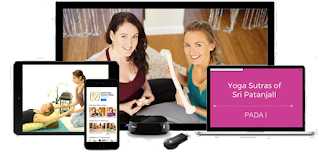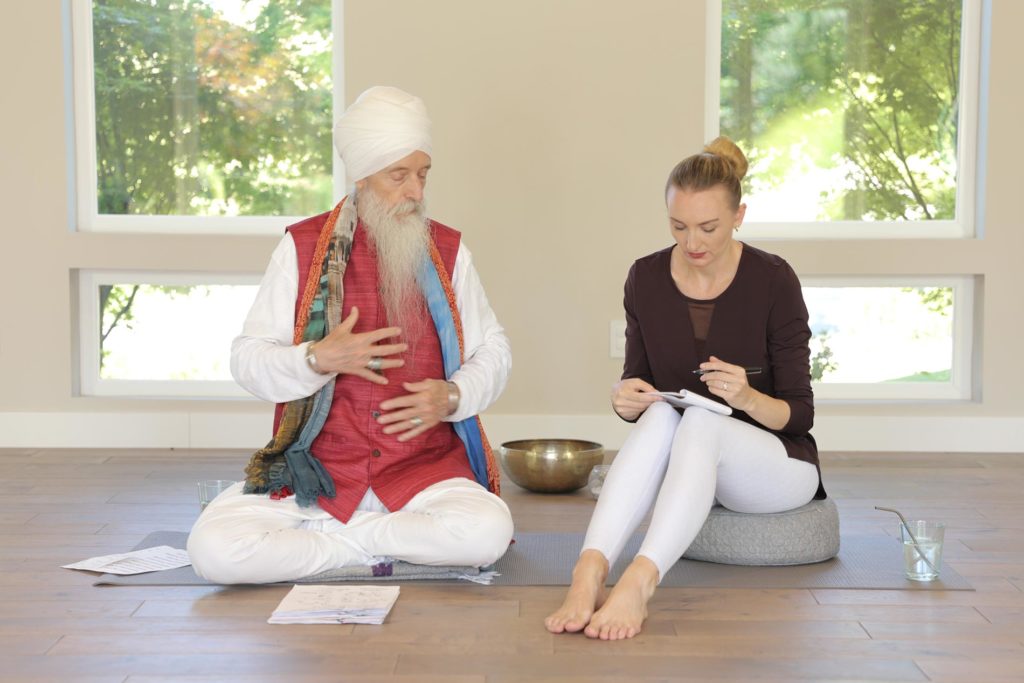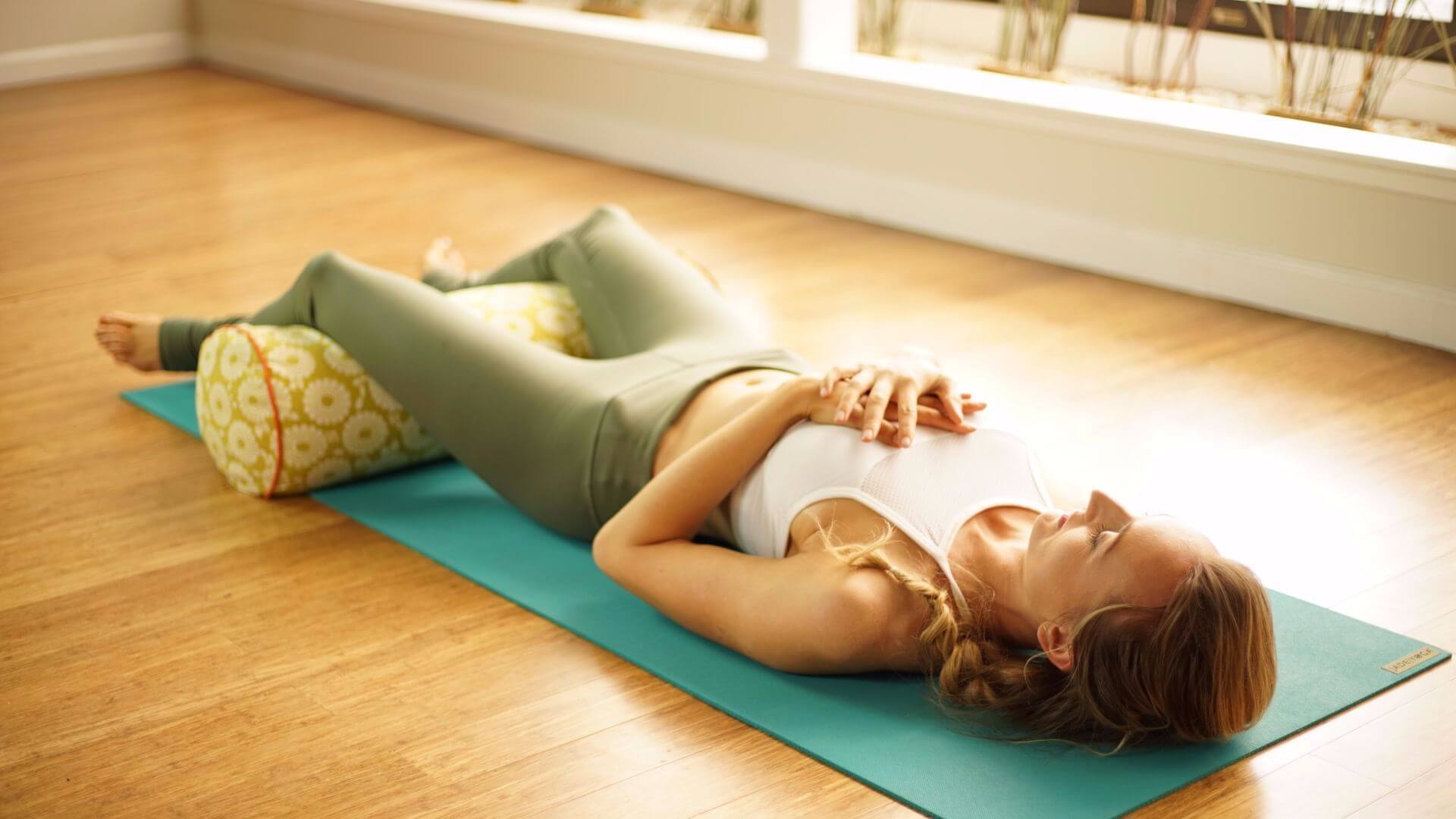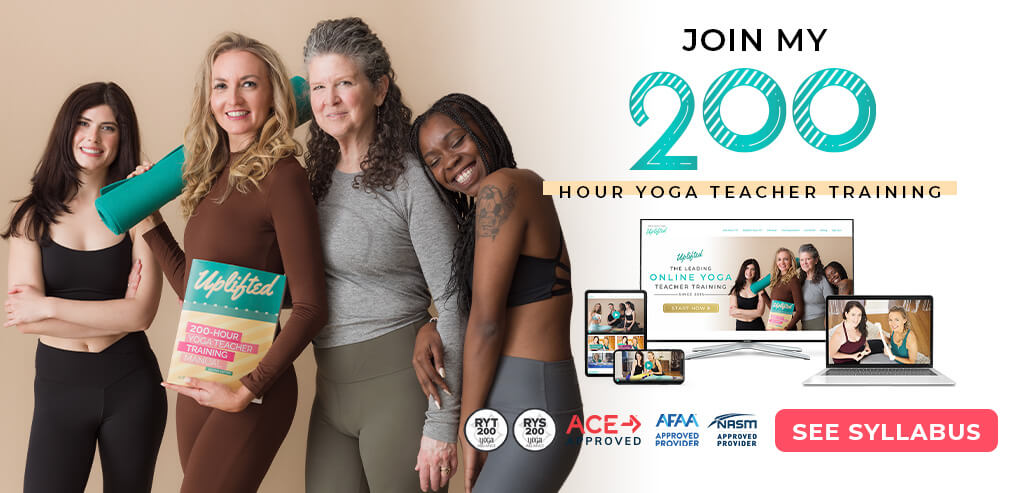
If you’re wondering, “Can I teach yoga if I’m overweight?”, you might be struggling with some of the expectations that just seem to keep piling up on yoga teachers these days. You’re not the only one!
Yoga teachers are expected to juggle soooo many balls. We are somehow expected to represent an ancient practice tradition, hold space for people to heal, pioneer a practice of wholesome wellbeing within our fitness-crazed culture, and do it all in a tight pair of show-all pants, to boot.
Oh, and ☝️ make it look easy.
If we look to the heart of yoga, the answer is clear! Yes, you can teach yoga if you’re overweight. And by studying yoga deeply, you can turn any questions of worthiness into courageous actions of self-love, healing, and community-building, as a teacher and as a human being.
And that’s what this article is all about ❤️ We’ll go over my take on representation in the yoga space, bust the most common myths I hear about yoga teachers, look at how to center your practice and connect with body-positive community.
Yoga is for Everyone
Yogis know this: Yoga (yes, with the big “Y”) truly is for everyone. But what does that actually mean? When Yoga first was mentioned in the Vedas and later in other Sanskrit texts, never was it related to certain conditions or requirements we need to meet as human beings.
Society can limit how we see ourselves compared to those around us, and the internet doesn’t help! Yet, Yoga does not discriminate. That, after all, is the beauty of the practice: true Yogis can be young and old, male and female, believers and atheists, Westerners and Easterners. And we come in all sorts of different body types!
Representation Matters
As a Yoga instructor, if we can welcome this principle into our practice and classes, not only do we give ourselves space to be free of any limiting beliefs, but we also create space for others to be themselves. Let me tell you, I LOVE the internet, but current trends in social media over-represent slim bodies.
This is the reality of being adjacent to the fitness industry, but it does. not. mean. that you must be a slim thing to teach yoga.
Jessamyn Stanley is rocking it on Insta, and there are so many others out there! Check out the body positive section below for more Insta-gorgeous yogis leading the body-positive movement.
They remind us of that yoga is not about how we look, but how we feel. And everybody deserves to feel good.
You might also like: Yoga Teacher Resources
Respect Your Body
Maybe you’re bigger boned. Maybe you just had a baby, or take medications that make you gain weight, or maybe you’re struggling with a health issue like thyroid imbalance, eating disorder, depression… maybe it’s none of those things, and you’re, like, a super serious athlete with some major muscles 💪 ! The list goes on, but my point is that there are many reasons why you might be overweight. Whatever the reason is – the most important thing when considering a YTT is to respect your body. This goes for any potential yoga teacher, really! But we might need reminders if we start to view our condition as a problem, question our innate worthiness, or force an outward appearance that doesn’t reflect our inward experience.
If you are on a weight loss journey, the yogic approach would most definitely include reflecting on aspects within yourself that you might need to work through energetically that relate to being overweight.
Remember that your health goes beyond annamaya kosha, the physical layer. When teaching Yoga, your role is to guide others to a place of ease and acceptance within themselves. If you have personal experience cultivating your own ease and acceptance and are passionate about sharing this with others, you’ll make an awesome yoga teacher – no matter how much you weigh.
Need some inspiration for self-love and acceptance? Check out 15 Heart Chakra Affirmations to Unlock Unconditional Love.
Fall in love with my 200-Hour teacher training or …
Experience 3 Training Videos from Inside My 200-Hour Online YTT

Common Myths About Yoga Teachers
This brings us to myth-busting 💥 Just as we need to practice affirmations to condition our thinking of what’s inwardly possible, it’s important to check in with what we think is fact now and again. Here are some of the most common myths I hear about yoga teachers, and why they’re not true.
Myth #1: All yoga teachers are flexible.
With the internet bringing the world to our fingertips, every day we see images of yogis bending and twisting in crazy ways. Remember that those cray Insta-famous yogis might also be a) acrobats b) dancers c) Olympic gymnasts, or d) all of the above. The fact is, most yoga teachers aren’t any of those things. They’re yoga teachers, busy teaching yoga! The heart of yoga is about bringing the mind into a peaceful state, and flexibility is a side-effect of dedicated asana – not a requirement for teaching it.
Myth #2: Yoga teachers are all thin and physically abled.
When Yoga became main-stream enough to make appearances in gym classes and exercise studios, it was folded into fitness trends, for better or for worse. Very fit-looking teachers are celebrated and sponsored by the big athletic brands. But! It’s important to note that one could do all of the poses and not necessarily practice, or teach, actual Yoga.
Myth #3: Yoga teachers are always happy.
Most people would describe us teachers as happy, calm, tolerant, and kind. However, we are all still like any other person going through the highs and lows of life! There are times when we don’t have all the answers and need to take a deep breath, take a break, express our anger, break down crying, or whatever. We are humans after all.
Myth #4: Yoga teachers only wear tight-fitting clothes.

Thanks to some big fitness brands, we all know the go-to yoga outfit by now: tiiiight yoga pants (you’re lucky to find a pair that don’t reveal your backside when you bend over 😳) and a matching sports bra in candy colors. As someone who lives in this uniform, I can say that it’s way comfier than business casual. If you’ve ever been to an ashram in India though, you know that the tights + bro combo is quite far from what’s considered respectable. There is no talk in the traditional circles about fat bodies, diet fads, or the need to lose weight to create a certain look. In India, many yoga teachers wear loose-fitting clothes that often cover the whole body out of respect. My opinion? Yoga clothes should be comfortable and appropriate! Whatever that means for you.
Myth #5: Yoga teachers can do all of the asanas.
If you think your yoga teacher was birthed into this world in full splits, think again! Many yoga teachers actually get into yoga because they can’t do all of the asanas. Yoga teachers may be more obsessed with the impossible than the average human, but this still doesn’t mean they can do all of the asanas. The truth is, everyone – including yoga teachers – will encounter a few postures that are just really difficult for their bodies. This usually has nothing to do with body type or size, but rather anatomical structure.
Note that the yogic principle ahimsa encourages bypassing any postures that cause harm. In fact, one tell-tale sign of a highly skilled yoga teacher is that they do not demonstrate asanas in class at all – it’s much harder to pace a class without practicing the poses, and requires disciplined focus on what’s happening in the room.
You might also like: 10 Truths About Becoming a Yoga Instructor
Center Your Practice

If you’re feeling a bit insecure about teaching in your current physical condition, whether you’re overweight or not, the most important thing to do before you stand up in front of a class is to center your own practice. Sometimes we even need to step away from teaching in order to clarify our intention, to heal, or to reconnect with why we’re teaching at all – that’s totally ok! Restorative yoga and meditation offer powerful tools to find center when we feel out of balance. It’s also wise to ask yourself these questions:
Who Are You Practicing For?
Remember that Yoga never asks us to prove ourselves. Whether you’re an experienced teacher or deciding whether or not you’re ready for your first yoga teacher training, Your practice is a time to connect with your true self, to breathe deeply, to release ego-attachments, and to release anything that doesn’t serve you. You should never practice solely to be better than your students, to keep up with other teachers, or even to keep your job. Whether you are joining someone else’s class or practicing on your own, always practice first, for you. This doesn’t mean that we shouldn’t consider the benefits our practice brings to our community and loved ones. On the contrary! By prioritizing our connection with self, we become more available to give, because we’ve checked in with our own needs. If you find yourself rushing to keep up in a vinyasa class, it’s always a good idea to take a break in child’s pose and reconnect with your breath and intention before continuing.
Who Are You Teaching For?
New teachers and teachers in training tell me all the time that they feel pressure to entertain or perform. If we look at the root of this urge, we find these tendencies are driven by comparisons to other teachers, and ultimately by our own ego. While performing is a part of the job, yoga teachers are ultimately not here to put on a show. We are here to help each student to help themselves. We give students tools to do their own work.
In other words, get to know your students better! If you know what is most challenging for them, what they’re motivated by, and what patterns they want to break, you’ll be able to teach from a place of compassionate service rather than self consciousness.
Take my quiz to find out which YTT is best for you:
Find A Body-Positive Community
We all need affirmation now and again that we are the gorgeous, sparkling, capable and creative humans that we truly are! Seek out spaces, in real life and virtually, that make you feel good about yourself and your body. If you are as Insta-obsessed as I am, make sure to follow body-positive accounts that leave you feeling inspired after 10 minutes of scrolling. Following accounts that leave you depleted, depressed, or self-conscious?
Say bye 😘
Unfollow.
Practice my affirmations for joy and emotional wellbeing.
I repeat: you deserve to feel good about yourself.
Aaaand.. follow accounts that give you positive vibes! Don’t know where to start? Check out: @mynameisjessamyn, @tessholliday, @itsmekellieb, @theshirarose, and @scarrednotscared. These are accounts of people who remind us of the amazing things our bodies can do and how we can be more accepting of both our own bodies and of those around us.
Next Steps
- Check out my YouTube channel and find some yoga classes that you can try out for yourself!
- Explore my knowledge hub for How to Become a Yoga Teacher
- Attend a 200 YTT info session to see what else you’ll learn in my online teacher training.
Experience 3 Training Videos from Inside My 200-Hour Online YTT

YOU MIGHT ALSO LIKE
- What is Yoga Alliance and Do I Need an RYT Certificate to Teach Yoga?
- 200 Hour Yoga Teacher Training: What To Expect, How To Prepare, Where To Do It
- Is An Online Yoga Teacher Training Worth The Investment?
- Levels of Yoga Certification: What’s The Difference Between 200-, 300-, and 500-Hour YTT Courses?yoga certification
- What Does A 500 HR Yoga Teacher Training Course Cover? Standards and Benefits
- A Guide to The Best Yin Yoga Teacher Training Programs
- Hatha Yoga Teacher Training Certification: Immersion, Online, or in Studio?
- Wanna Teach Kids Yoga? Find A Fun Childrens Yoga Teacher Training!
- Ashtanga Yoga Teacher Certification: Where And How To Get It
- How To Know If An Online YTT Is Legit: 8 Things To Look For
- Want to Become a Certified Vinyasa Yoga Teacher? Read This.
- How to Choose a Yoga Teacher Training (That Won’t Rip You Off)










